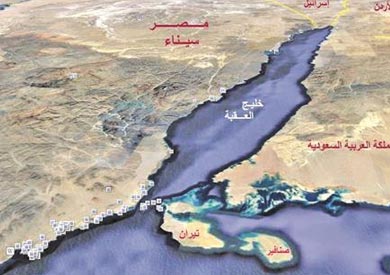
Egypt’s Administrative court verdict that nullifies the controversial Egyptian-Saudi demarcation agreement, slapped al-Sisi and his government’s waiver of the two Red Sea islands of Tiran and Sanafir to Saudi Arabia.The Egyptian public opinion has received the verdict with satisfaction. However, the unexpected verdict, that was issued by Egypt’s administrative court, raised questions about the timing of the verdict and its repercussions on the Egyptian-Saudi relations.
Saudi Arabia has been one of the major supporters of the military coup of 2013 against Mohammed Morsi, the first democratically elected president. The Kingdom has offered al-Sisi -the coup leader- unprecedented financial aids to stabilize his rule. It has granted Egypt a $12-billion-aid package along with the UAE and Kuwait which is four times as much as the military and economic grants from the US and the EU combined ($1.5bn and $1.3bn respectively). Moreover, the total projects that benefit from the Saudi grants are nearly 392 projects with about $200 million till June 6, 2016 (307 projects through the Social Fund Development and 85 projects through the National Bank of Egypt). In addition, the Saudi investments in Egypt are around $6 billion.
In this context, Wall Street Journal said that although the Administrative court’s verdict is not final and that the government can appeal the court’s ruling, but the ruling itself is considered as a great challenge to the relation between Riyadh and Cairo in a very a critical moment. ”The verdict is a challenge to Saudi Arabia–one of the significant backers of al-Sisi- and the judicial branch which is protected from the interference of the executive branch in its affairs, but at the same time abiding to the verdict could escalate the tension between Saudi Arabia and al-Sisi-who is considered the major Saudi ally against the rise of the Iranian power.”
Accordingly, some observers believe that the verdict would negatively affect Egypt’s relation with its strategic Gulf donor in the light of the Saudi media and the fact that Saudi Arabia has started to take steps as the right owner of the islands. In this context, Dr. Tarek Fahmy-the political sciences professor at the American University in Cairo- said that the Egyptian-Saudi relations would be affected by the verdict as Saudi Arabia has already started to take steps based on its agreement with Egypt in April 2016 for both Red Sea Islands, and he pointed to the Saudi Vision 2030 that included projects and logistic zones as King Salman’s Bridge between both countries. Saudi Arabia’s Shura Council has also approved the recent agreement on the demarcation of maritime borders between Egypt and Saudi Arabia on April 25, 2016. In addition, Dr. Fahmy added that Israel has started negotiations with Saudi Arabia over signing a treaty away from Camp David Agreement after the official transferring of both islands. But he considered the matter as too early to talk about moving the case to the international arbitration. The economic expert Dr. Mohammed al-Naggar also said, “Saudi Arabia will not accept the verdict that nullifies the demarcation agreement and the return of both islands to the Egyptian sovereignty.” He also added that Saudi Arabia did not take any response until now as it knows well that the verdict is not final and that the Egyptian government will appeal the verdict. In the same context, the director of the Saudi Middle East Research Center for the Strategic and Legal Studies, Anwar Ashqi, said that the verdict does not matter as it was released by an internal court and this makes it nonobligatory to Saudi Arabia, “as internal courts aren’t specialized in the international cases and the only one responsible is the Egyptian Parliament,” he said, adding, “In case the Egyptian regime withdrew from its agreement with Saudi Arabia, the latter would resort to the United Nations or the International Court of Justice.” Other Saudi sources stressed that the verdict is an “internal issue” but at the same time, Egypt is committed to the demarcation agreement as it was signed by the Egyptian government and it should deal with the agreement according to the International rule and regulations. Despite there was no official response from the Saudi counterpart on the verdict but some observers believe that Saudi Arabia will not give up the two islands and that the Saudi-Egyptian relations would be affected by the verdict and it would put pressure on Egypt by either the financial aid or international arbitration card. In this case, Egypt will face a great challenge, especially that the latest Saudi aid came at a critical time as Egypt’s economy is suffering severe problems.
On the Other hand, some experts said that the verdict will not affect the Egyptian-Saudi relations as both countries share common strategic interests in many cases. Moreover, al-Sisi and his government will do all their efforts to face this verdict in order not to lose their financial donor. Ambassador Abu Bakr al-Deeb said that the verdict will not affect the demarcation agreement between both countries due to the strong economic and political ties between both countries. In the same context, Nagy al-Ghatrefy-the former Egypt’s Foreign Minister Assistance said that the verdict will not affect the relations between both countries, especially that it isn’t the final verdict. On his behalf, Ibrahim Youssry- the former Foreign Minister assistant- said that the verdict will not affect Egypt’s relations with Saudi Arabia as he expected that “the verdict will not be implemented.” He also suggested that the Egyptian government will issue an appeal against the verdict. In fact, right after the verdict, the Egyptian government appealed against the administrative court nullification of the al-Sisi plan to cede control of the two Red Sea Islands to Saudi Arabia.
Other experts believe that the verdict could not have come without al-Sisi’s previous knowledge, and that it would be a good opportunity for al-Sisi to use the verdict as a card to gain from Saudi Arabia more concessions especially that the budget deficit has reached this month $30 billion or to renegotiate the agreement’s details once again with the Saudi counterpart to represent it in a new way to Egypt’s public to contain their dissent against giving up the two strategic islands. However, in both cases, it isn’t expected that Saudi Arabia will be flexible with al-Sisi regime after receiving huge financial grants from 2013 till now.
In this context, different scenarios were presented by many experts and observers regarding the future of the demarcation agreement. The first scenario, Saudi Arabia would resort to international arbitration in case al-Sisi and his government abide to the final verdict of the administrative court. The second scenario, Saudi Arabia will wait till the government’s appeal is accepted by the court or until al-Sisi’s parliament would choose going through direct confrontation and ratify the agreement even if the highest court refused the appeal. The third scenario is the announcement of a public referendum to obtain the Egyptian public opinion’s acceptance of the agreement. The fourth scenario, both Egypt and Saudi Arabia would solve the crisis internationally away from Egypt’s public opinion. Al-Sisi would cooperate with Saudi Arabia away from Egypt’s judiciary and put the case in front of the international arbitration. The ambassador Hassan Haridi –the former Foreign Minister assistance- said that the case would end in favor of Saudi Arabia if both countries agreed on presenting the case to international arbitration or the international court of justice. In this case the Saudi stance will be strong in the light of al-Sisi’s acceptance together with his government regarding the treaty, especially that the international arbitration depends on the approval of both parties.
Egypt’s Administrative Court ruled the invalidity of the controversial demarcation agreement that stipulates the transfer of Tiran and Sanafir islands to Saudi Arabia. A number of lawsuits were filed in an attempt to nullify the agreement. In response, The Egyptian government appealed against the administrative court’s nullification of the al-Sisi plan to cede control of the two Red Sea Islands to Saudi Arabia. The maritime border demarcation agreement was signed in April between Egypt and Saudi Arabia.
At an earlier session, Egypt’s administrative court called the government to present a copy of the agreement while lawyers presented various evidence, documents, and maps that support their claim that the islands are Egyptian. Khaled Ali- the human rights defender and the former presidential candidate- presented to the court an Atlas that he said was prepared by the Egyptian military in 2007 to confirm that Tiran and Sanafir are Egyptian and fall under Egyptian sovereignty.
The court provided several reasons for rejecting the deal, including former agreements, old maps, and an index of names of Egyptian places made by the finance ministry in 1945 and other official documents, practices and facts dating back to 1884.
The court issued in a document the arguments of its verdict, “According to the above reasons, it is definite that both the islands of Tiran and Sanafir belong to the Egyptian territories and are located within the borders of the Egyptian state and that Egypt has continuously exercised sovereignty over the two islands.”
Although the verdict is not final and can be appealed by the Egyptian government, it is still “enforceable” and it makes the recent deal null and void, preventing the Egyptian parliament from discussing the issue.
Shawki al-Sayyid, the law professor at Cairo University, said that “The verdict is enforceable and binding to all the country’s institutions including the parliament, and the government’s appeal is to be determined by the Supreme Administrative Court.”
In the same context, Novelist Ahdaf Soueif said, “This is a very important ruling, it essentially means that the people who went out to insist that these islands are Egyptian, and some of them are still serving jail sentences, were right.”
After the court’s verdict, lawyers, activists, and spectators rushed out of the courthouse cheering loudly and expressing their happiness over what they deemed as the best outcome for the ruling. Moreover, Egyptians expressed their support to the administrative court verdict on the social media whereas the hashtag Tiran and Sanafir are Egyptians was reported as one of the most circulated hashtags on Twitter.
The controversial agreement that gave away the two strategic islands of Tiran and Sanafir to Saudi Arabia has led to massive criticism and outrage among the Egyptians. Critics, journalists, and activists accused Abdel Fattah al-Sisi of “selling Egypt” to Saudi Arabia in return for financial aid.
In response, thousands of Egyptians took to the streets in protests on April 15 (Land Day) and April 25 (Sinai Liberation Day) against the agreement, calling for the “Downfall of the Regime.” The demonstrations were the first huge movement against the al-Sisi regime that included different political affiliations and groups. The Egyptian security forces led arrest campaigns of activists and journalists who opposed the transfer of the islands.
The Egyptian courts have fined tens of the protesters while others were handed down prison sentences that ranged from two to five years. In addition, a court sentenced seven defendants to eight years in prison each and fined them.
On the other hand, al-Sisi defended the agreement in a televised speech in April, saying that “Egypt does not sell its land to anyone and it does not take anyone’s land.” Moreover, the Egyptian cabinet assured in a previous statement that the strategic islands are Saudi, adding that Saudi Arabia requested Egypt to protect them in 1950, and they have been under Egypt’s control since then.
The two Red Sea islands, which are strategically significant as they both control maritime activity in the Gulf, are located at the Gulf of Aqaba. The Tiran Island is located in the Gulf of al-Aqaba, about 5 or 6 km from the Sinai Peninsula, and it has a total area of about 80 square km. Sanafir Island lies to the east of Tiran with a total area of 33 square km.



